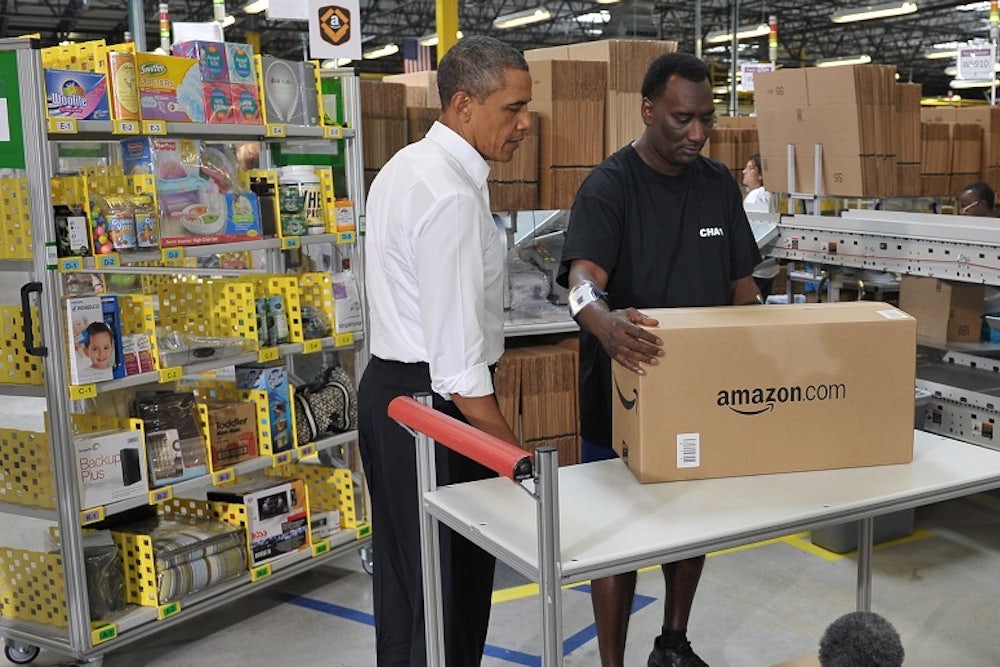On Wednesday, the Supreme Court heard oral arguments in a case of workers looking for fair pay from the corporations that employ them. The legal arguments in it are arcane and legal analysts say it could go either way. But this case, whatever the outcome, has a surprising twist: the Obama administration has sided against the workers.
Here are the details of the case: Jesse Busk and Laurie Castro both are former employees of Integrity Staffing Solutions, which runs warehouses for large companies, such as Amazon. At the end of each workday, Busk and Castro—along with hundreds of other workers—were forced to wait in line to go through a metal detector to ensure they weren’t stealing anything. At times, this process took 25 minutes—time that the warehouse workers weren’t paid for. Believing they deserved compensation for that time, Busk and Castro sued Integrity for violating the Fair Labor Standards Act. In April, the Ninth Circuit Court of Appeals ruled in favor of the workers and Integrity appealed the case to the Supreme Court.
To simplify a bit, this case rests on a basic question: when does work stop? But it doesn’t have a simple answer. Not everything a worker does is compensable under the law. At the beginning or end of the day, for instance, the activities have to be tightly related to a worker’s primary job. In legalese speak, the end-of-the-day activities must be “integral and indispensable” to the worker’s principle duties. In previous cases, the courts have ruled that standing in the line to clock out at the end of the day is non-compensable, because it is not integral to the workers’ duties. Removing protective equipment, however, is compensable since it is necessary for workers to perform their duties.
So, is going through a post-work security clearance “integral and indispensable” for Integrity’s warehouse workers? Busk and Castro certainly think so and the Ninth Circuit agreed. The AFL-CIO also filed a brief on the workers’ behalf. “Integrity Staffing…has a very strong efficiency-based interest in safeguarding the merchandise its employees handle,” it says. “Because of the close relationship between Integrity Staffing’s interests in deterring theft and employees’ primary job duties handling merchandise, the anti-theft screenings constitute a compensable principal activity.”
Business interests, not surprisingly, have sided with Integrity. The Chamber of Commerce, for instance, filed its own brief in support of Integrity. But what surprised many on the left was that the Obama administration joined with the Chamber against the workers. “We were surprised, especially given that…the administration is stressing that workers’ wages are too low and it has taken important recent steps to boost their earnings,” said Catherine Ruckelshaus, the general counsel for the National Employment Law Project. “This doesn’t square with those goals.”
“From what I know about the case, these workers should definitely be being paid for their waiting time,” said Jared Bernstein, the former chief economist for Vice President Joe Biden. “… I don’t know why the administration disagrees. It seems inconsistent with other positions that are trying to ferret out this kind of cost shifting in other places in the labor market. It may be that there are enough government workers that pass through medical detectors on their way to work that there’s a concern about what the decision to do to their own processes with that regard.”
It would certainly be cynical for the administration to side with Integrity not, because it was persuaded by their legal arguments, but because it was worried about paying its own workers more. But that just may be the case. As the Economic Policy Institute’s Ross Eisenberey points out, in its “Statement of Interest” for the amicus brief it filed with the court, the government discloses that it employs workers under the exact same conditions as Integrity. “In other words,” Eisenberey writes, “as an employer, the government wants to be able to get away without paying its own workers for their time.” The Department of Labor didn’t respond to a request for comment.
At the same time, the White House has spent much of this year using executive actions to raise the wages of government workers. They have required federal contractors to pay workers at least $10.10 an hour, prohibited them from discriminating against LGBT employees, and strengthened overtime pay rules. It doesn't make much sense for the administration to make those moves if they are worried about paying federal workers more. In other words, it's unclear why the administration has sided with Integrity.
In the end, this case won’t have far-reaching implications for labor law, but it could make a significant difference for thousands of warehouse employees who are forced to waste hours a week, unpaid, in security lines. Will the Court rule in the workers’ favor? That’s tough to tell. But the Obama administration isn’t helping their cause.
This post has been updated.
